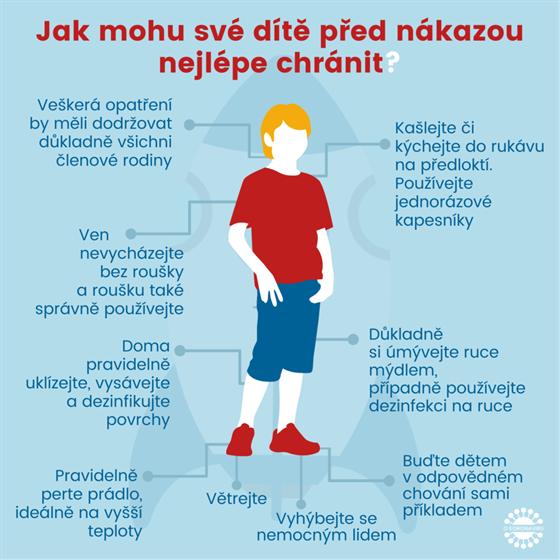Questions and answers: How should parents deal with the course of COVID-19 in children<
A few weeks after the spread of COVID-19 worldwide, the results of the first scientific studies examining the importance of this disease in different age groups are emerging. It has been known since the onset of the current pandemic that COVID-19 is more severe in the elderly. However, parents' questions about the course of COVID-19 in children are very common. The article contains answers to the most common of them.
Okoronaviru.cz The portal provides scientifically validated information on the current COVID-19 pandemic and disease. Articles and practical guides from experts from the Academy of Sciences and a number of universities present the latest findings and studies from around the world in an understandable way. |
The text is based on the recommendations of professional institutions (Ministry of Health of the Czech Republic, CDC) and current Chinese studies that describe the course of the disease in children.
Can children get COVID-19? According to current studies in China, where the COVID-19 epidemic began in December, the SARS-CoV-2 virus can affect individuals of all ages, including children. In general, however, children are less susceptible to infection than adults. Of the total number of infected, children under the age of ten make up about one percent. The youngest patient was a newborn who was diagnosed 36 hours after birth (see Questions and Answers for Pregnant Women).
Is the risk of COVID-19 infections in children the same as in adults? As COVID-19 spreads from person to person, the risk of infection in children of all ages is comparable to that in adults. Overall, however, children are less affected by this infection than older individuals. A smaller percentage of infected children than adults is probably related to their lower exposure to the disease. Very young children are usually at home with their families, so they are less likely to meet someone infected.
Coronavirus and pregnancy. What we know so far about the effects on the fetus and the baby |

School-age children have a higher risk, but due to the current quarantine, they are also at home and their contact with the environment is minimal. Most often, children become infected from infected family members, who may have an asymptomatic course of the disease.
What is the course of COVID-19 in children? Are they different from adults? The vast majority of COVID-19 cases in children were mild and uncomplicated. SARS-CoV-2 virus has even been detected in some children without causing any signs of infection. It was therefore an "asymptomatic course". Fever, cough, and red throat are relatively common symptoms in COVID-19 in children. Colds, vomiting or diarrhea have also been reported.
Can COVID-19 in children have a serious course? Which children are most at risk? Severe disease-intensive illness is rare in children. It occurs more often in children who suffer from chronic diseases or have some other health complications. The probability of a more serious course also increases slightly with the lower age of the infected child.
Coronavirus can cleverly escape our defenses, says immunologist Zadražil |
According to a Chinese study, which we will cover in a separate article, children under the age of one were observed to have a more severe course slightly more often than older children. Child deaths are quite rare and are mostly related to another associated illness of an infected child.
Are boys or girls more affected by COVID-19? There was no significant difference in the incidence of COVID-19 in girls and boys.
How can I best protect my baby from infection? The most appropriate way to protect your child from COVID-19 is to follow all government-mandated measures and follow recommended prevention principles. The importance of these activities needs to be explained to the children so that they understand them, but at the same time so that they do not get unnecessarily afraid. Parents can encourage them, for example through play, and should also monitor compliance with the principles on an ongoing basis. It is necessary:
How to prepare a household and a family if one of the family members falls ill? Because the vast majority of COVID-19 disease is mild, most patients infected are treated at home. In this case, it is absolutely necessary to follow the following rules to prevent illness of other family members:
How to avoid panic and stress at home with children? The area of mental health is crucial, especially in the case of quarantine. Therefore, parents should not underestimate her and their children. It is especially important to avoid panic and stress:
Summary |


 Tags:
Tags: Prev
Prev







